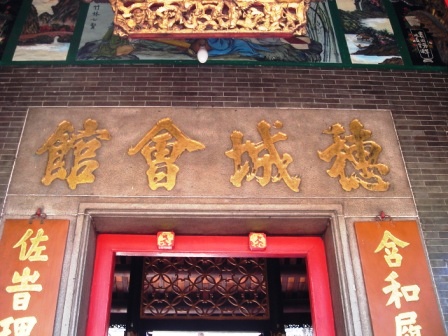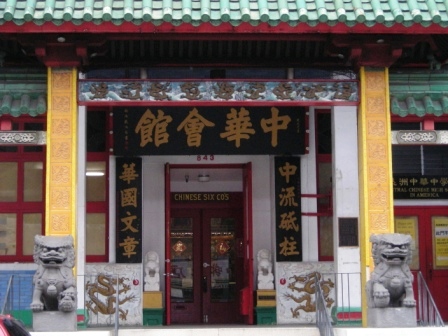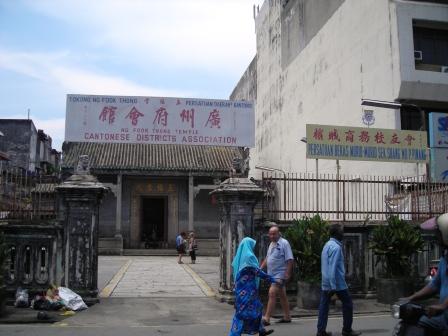
| Home | Chinatowns of the world | Festivals | Culture | Food Culture | History | Countries |
| Chinese Religion | Tours | Sitemap | Documentaries | About | Contact |
Clan Associations 会馆Clan associations (会馆 ,huay guan) can be found in almost every overseas Chinese society. They are called 会馆 (huay guan) or 同乡会 (tong xiang hui). Clan associations are formed on the basis of kinship, clan, dialect, home village, territory, or occupation basis. Clan associations had its origins in China and were reproduced overseas by migrant populations. Clan association plays various roles in overseas Chinese society. It serves as a contact medium between migrants and their hometown or region. When natural disasters or political crisis happened in China, clan associations raised fund to send back to China. One of the largest scales of such activities is the fund raising effect in South East Asia during the Sino Japanese war. Clan associations across the region raised funds for China Relief Fund to support china against the Japanese invasion. In the host society, clan associations address social, cultural needs of Chinese migrants. During the early period of Chinese migration, migrants had no social security to depend on so clan associations provided welfare services to look after the sick, destitute or widows. Among the most important functions that clan associations served at that time was the offering of funeral services. Rituals and prayers were conducted for the deceased and it was common for the clan associations to arrange for the remains of these migrants to be brought back to China. As they settle in their host societies and as family units emerged, clan associations initiate educational projects and served as registry of marriages for new couples. In many instances, clan associations function as lobby groups for their members in the host society. During the course of the year, clan associations organize festive and religious celebration and prayers. Through these activities, they reproduce their traditional cultural environment in host societies. Festive events include major festivals such as the lunar New Year (新年 xin nian), Qing Ming (清明 qing ming), dumpling festival (端午节) duan wu jie), seventh month (木兰节 mu lan jie), and mid autumn festival (中秋节 zhong qiu jie). Religious festivals are held according to the special dates of their patron deities. Common patron deities in overseas Chinese communities include Mazu, the Sea Goddess, Bao Sheng Dao Di (God of medicine), General Guan Yu and Guang Ze Zun Wang. Other religious events include Vesak day (韦塞节) and special events related to the Buddha and Guan Yin, Bodhisattvia of compassion, 观音. Celebrations were an opportunity to network with fellow countrymen, reinforce their cultural identity in a foreign land and gave them a sense of comfort and semblance of familiarity. Clan associations also offered protection for their members. Disputes between members could be brought to the clan association for settlement while problems with other dialect groups could be settled between representatives of the respective clan associations. Clan associations and temples usually have a very close relationship almost every clan association has a patron deity. When resources are available, they built a temple dedicated to the patron deity. Sometimes, the establishment of temples led to the formation of clan association. An example is the Thian Hock Keng Temple in Singapore. In other cases, the temple and clan associations are built at the same time and serve both social and religious functions. An example is the Goddess Matsu Temple, Tue Thanh Guild Hall in Ho Chi Minh, Vietnam. The official founding dates of clan associations or patron temples is an important milestone in the group’s history as it signals a level of economic resources and/or a population base. This is because wealthy leaders who were often entrepreneurs initiated the founding of clan associations. Overtime, when the main association grows too big, branch associations may emerge to address specific needs of the sub groups. Where there are numerous small groups, they may pool resources to co found a larger institution. Survival of a social institution depends on its ability to serve the needs of its members. Clan associations are no exception. In places where local born Chinese descendants assimilate into host society, clan associations may lose members and eventually close down. On the other hand, new generations have started to search for their roots and clan associations become the knowledge centre where they can learn about their own culture and heritage. Therefore, clan association’s fate in overseas Chinese communities can be seen as a microcosm of the interaction between the notions of ethnicity and nationality that unfolds and evolves in each overseas Chinese community. Related articles:History pageSingapore Clan AssociationsChinese Festivals |
|
| Join us on | Youtube | |||
| Copyright © 2007-24 Chinatownology, All Rights Reserved. | ||||






